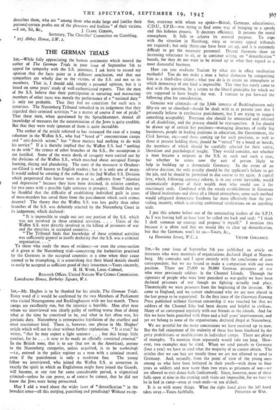THE GERMAN TRIALS Sts.,—While fully appreciating the human sentiments which
moved the author of The German Trials in your issue of September 5th to appeal for sympathy with the S.S. internees, I ask leave to record my opinion that the facts point to a different conclusion, and that our sympathies are wholly due to the victims of the S.S. and not to its members. That is, I should add, simply a personal opinion, but it is based on some years' study of well-authenticated reports. That the men of the S.S. believe that their participation in torturing and massacring members of other races was merely the performance of a "national duty" is only too probable. That they feel no contrition for such acts is notorious. The Nuremberg Tribunal remarked in its judgement that they . regarded their criminal activities "as a matter of course if not of pride." That these men, when questioned by the Spruchlcammer, denied all knowledge of measures for the extermination of the Jews is quite credible. But that they were truly ignorant of them is quite incredible.
The author of the article referred to has instanced the case of a young volunteer in the Waffen S.S., who had "heard of" concentration camps and "anti-Jewish action," but "these matters had nothing to do with his service." If it is thereby implied that the Waffen S.S. had "nothing to do with" the crimes of other branches of the S.S., the assumption is not justified. Some .of the worst deeds of savagery were carried out by the divisions of the Waffen S.S., which marched about occupied Europe burning, slaying and plundering. The story of the massacre at Oradour- sur-Gland is well known to English readers ; but it is only one of many. It would indeed be amazing if the ruffians of the 2nd Waffen S.S. Division which perpetrated that horror were to pose as sufferers from "injustice and depression" because they have been detained, in relative comfort, for two years with a possible light sentence in prospect. Should they not be thankful that the difficulty of establishing individual guilt in cases of mass-murders has saved them from the punishment which such crimes deserve? The theory that the Waffen S.S. was less guilty than other branches of the S.S. was definitely rejected by the Nuremberg Court in its judgement, which declared:
"It is impossible to single out .any one portion of the S.S. which was not involved in these criminal activities. . . . Units of the Waffen S.S. were directly involved in the killing of prisoners of war and the atrocities in occupied countries. . . .
"The Tribunal finds that knowledge of these criminal activities was sufficiently general to justify declaring that the S.S. was a criminal organisation. .. ."
To those who study the mass of evidence—or even the cross-section of it given at the Nuremberg trial—concerning the barbarities practised by the Germans in the occupied countries at a time when their cause seemed to be triumphing, it is astonishing that their bland denials should so easily be accepted as sufficient proof of their innocence.—Yours sincerely, H. H. WADE, Lieut.-Colonel, Research Officer, United Nations War Crimes Commission. Lansdowne House, Berkeley Square, W.1.


































 Previous page
Previous page